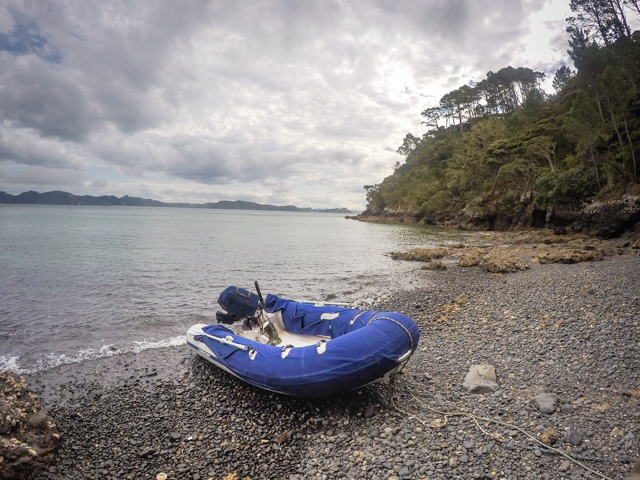A video from below the waterline of the Tayrona Years is in the works. Here’s a sneak peek!

Miranda and I made sure Tayrona was being looked after and then flew north to Rockhampton to meet up with my parents. With favorable winds the trip would’ve taken us just under a week of day-sailing to get up there, but we made it in an hour and a half. God bless jet engines. Then next morning we took a speedy ferry ten miles offshore to Great Keppel Island for a couple of days on the beach, decompressing from our whirlwind week. Finally got to meet an Australian possum face to face. Where North American opossums look like shaggy, overfed rats, these svelte tree-dwellers might be the love-child of a house cat and a chinchilla. Inquisitive critters…
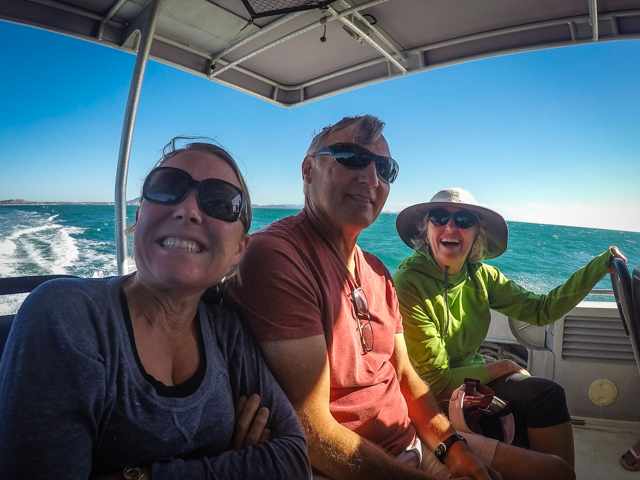
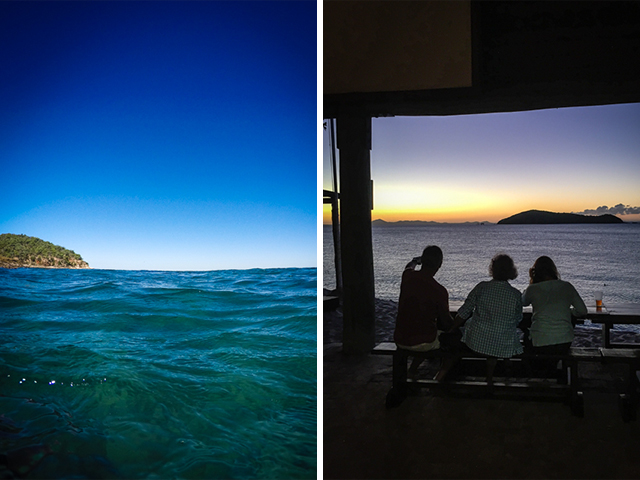
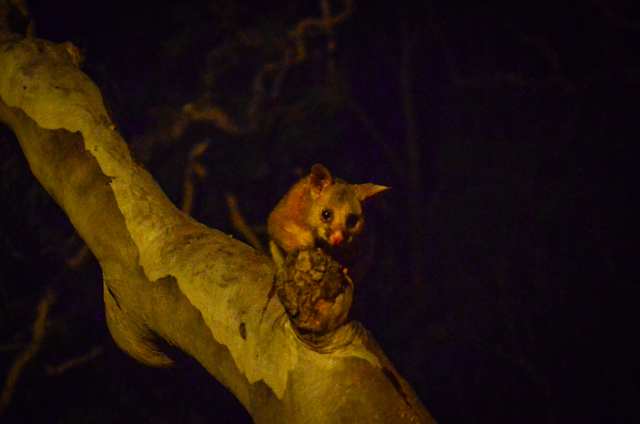
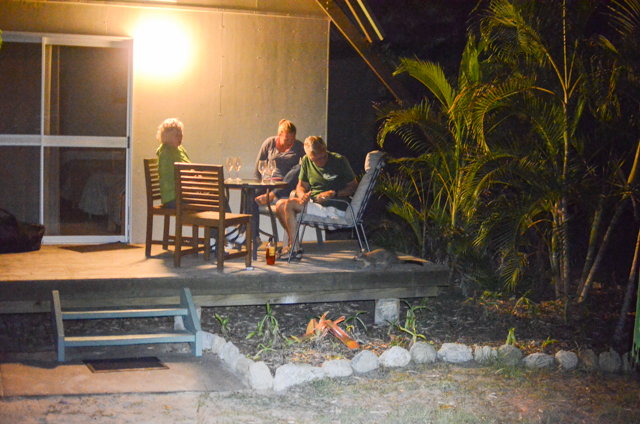
Great Keppel Island is a sleepy, sandy spit with gorgeous beaches interconnected with trails through the wooded interior. We spent a couple of days exploring the reefs off several of the beaches. The snorkeling was pretty good, the coral was pretty good, and the water clarity was pretty good. Geeze, what aquatic snobs we’ve become, pooh-poohing the Great Barrier Reef. The fish, though, were fat and plentiful, with walls of silver fingerlings, rays, and turtles.
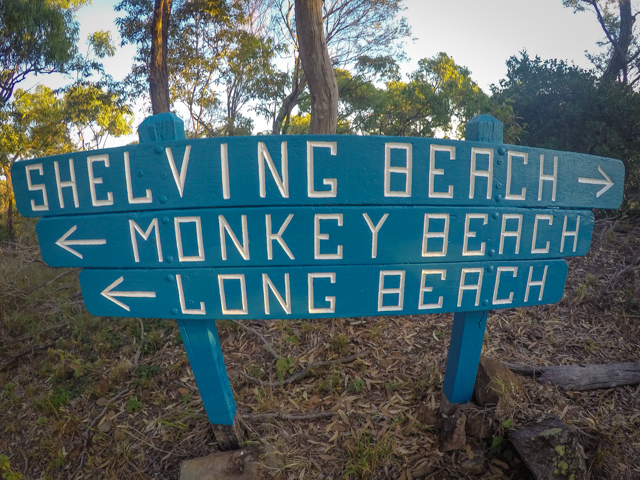
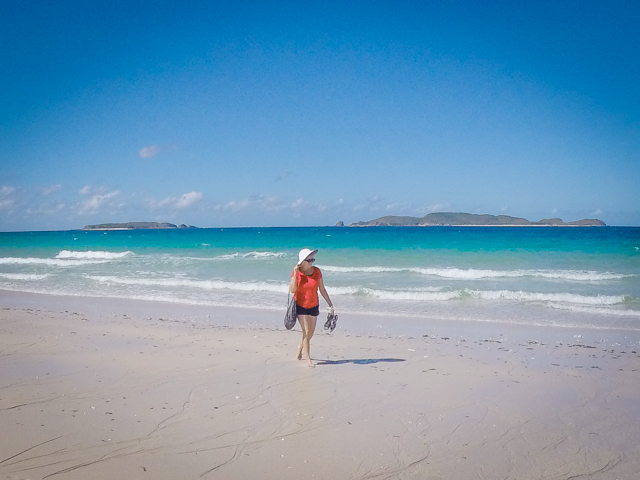
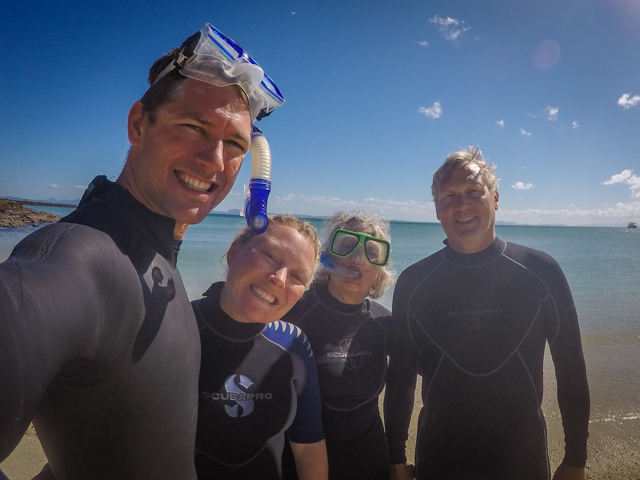
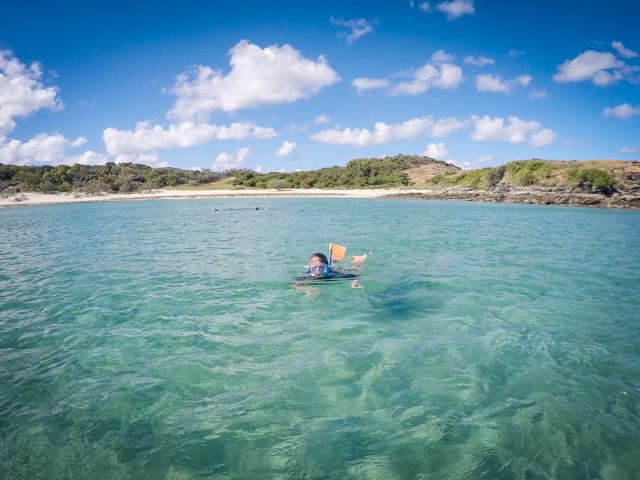
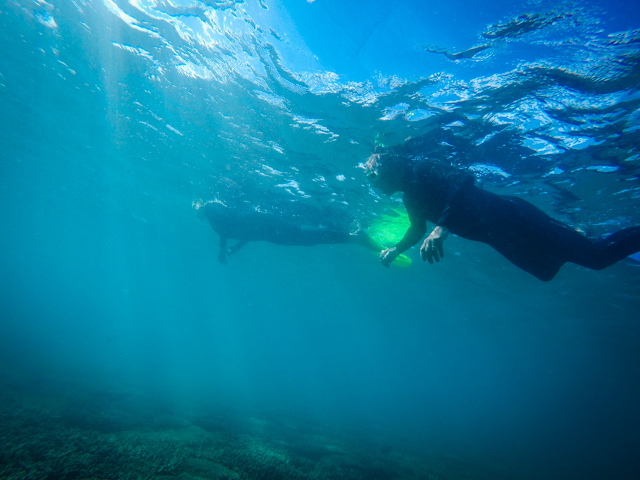
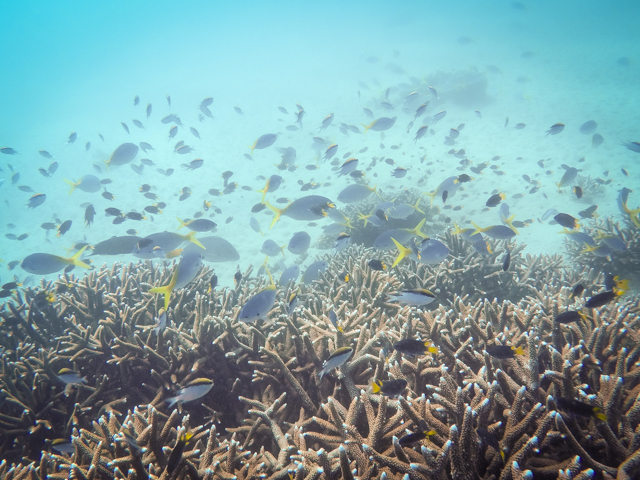
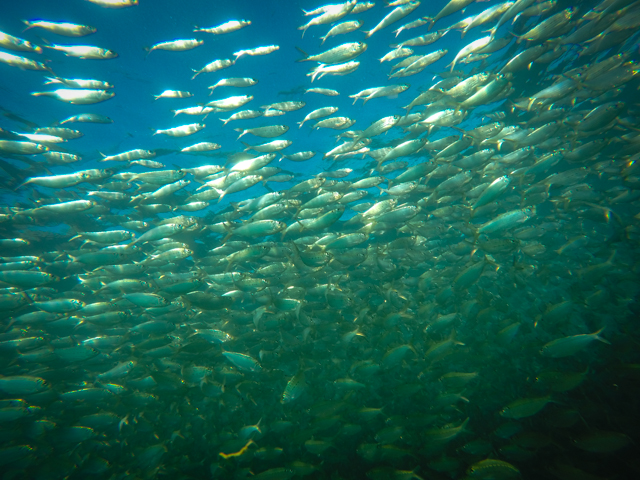
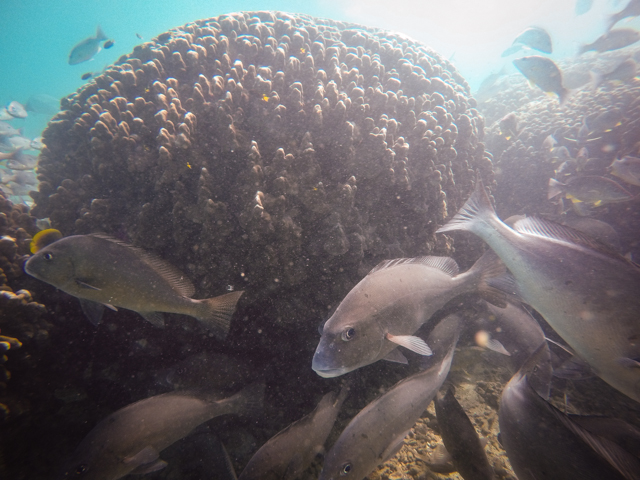
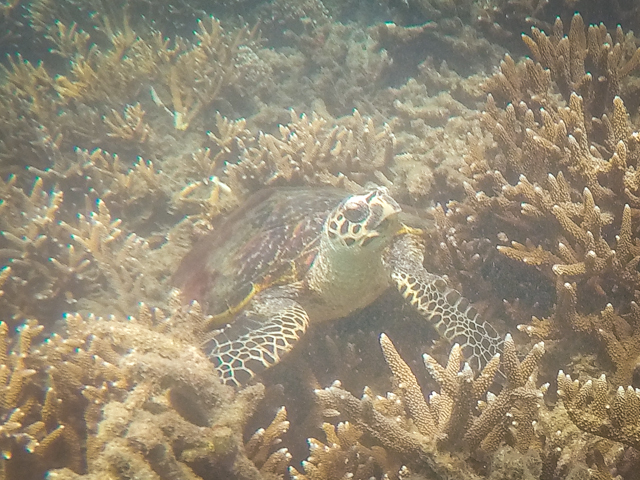
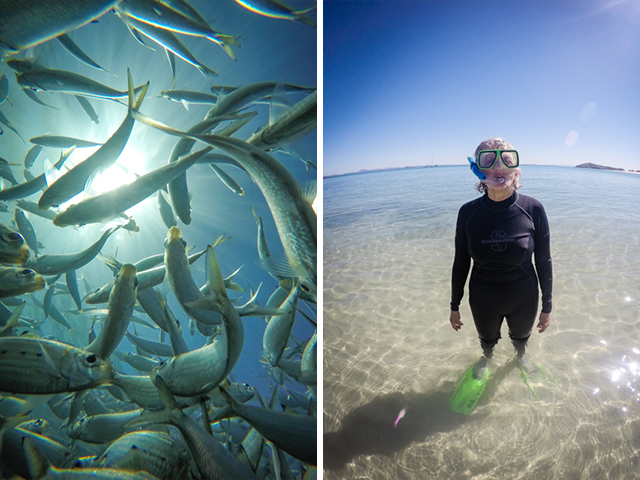
There was some coral dieback that we’ve been hearing about, but nothing too bad. On the topic of dying marine life, it appears that my wetsuit has contracted leprosy or is dating Edward Scissor-Hands. Or both. Man, salt and sun is an evil combination! This’ll undoubtedly be its swan song trip.
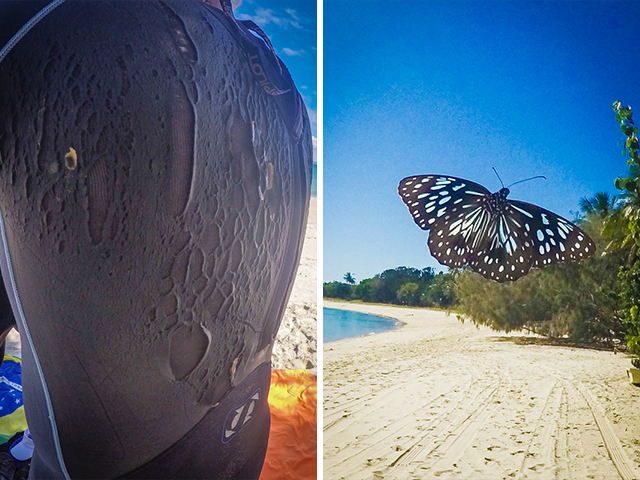
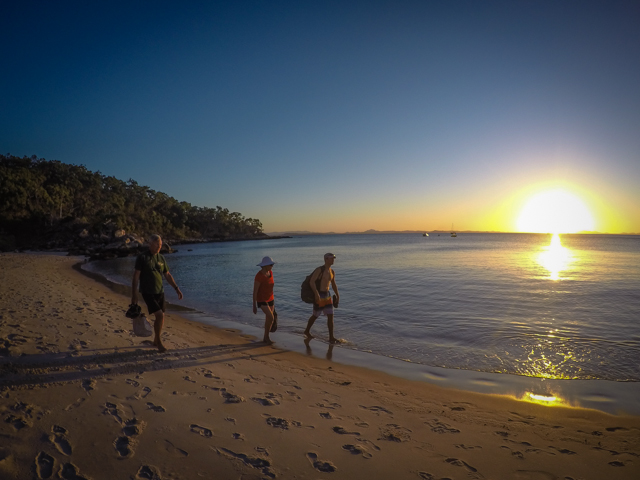
After a few days crisping on Keppel’s beaches we headed slowly south back to Brisbane, stopping in little towns along the way. We passed through Montville with steep, shady streets and pressed on to nearby Mary Cairncross Scenic Reserve which has a great rainforest hike with oozing vines, rowdy bats, and pademelons nosing about. Pademelons are tiny wallabies, which in turn are tiny kangaroos. So pademelons are tiny-tiny kangaroos. We even saw one with a joey sticking out of her pouch! Joeys are not only baby kangaroos, but any baby marsupial, including koalas, wombats, possums, opossums, bandicoots, and Tasmanian devils. Okay, fine, I’ll stop nerding-out now.
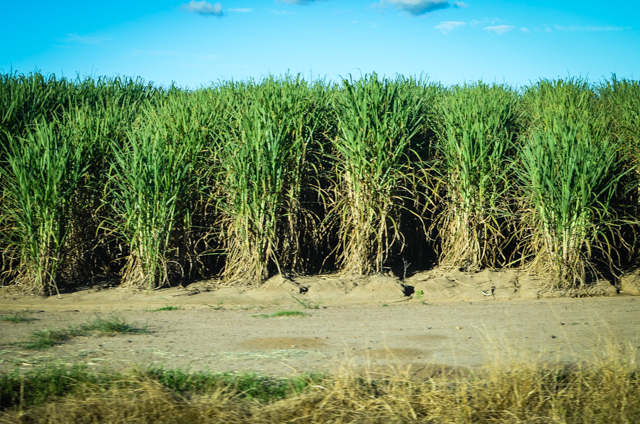
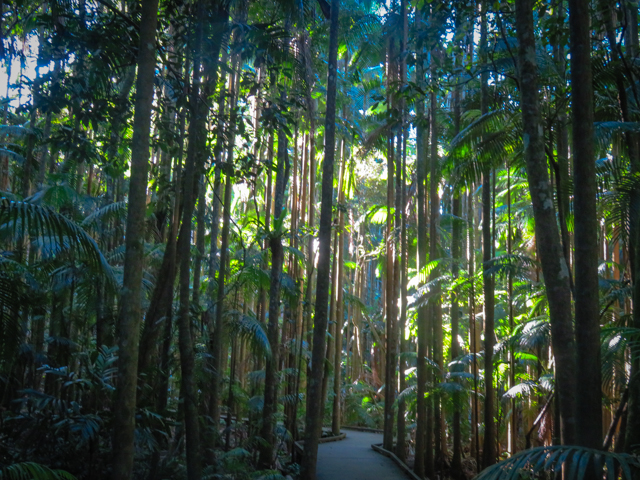
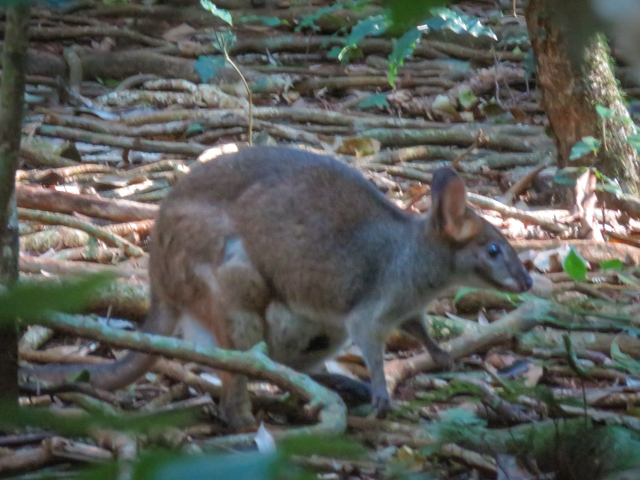
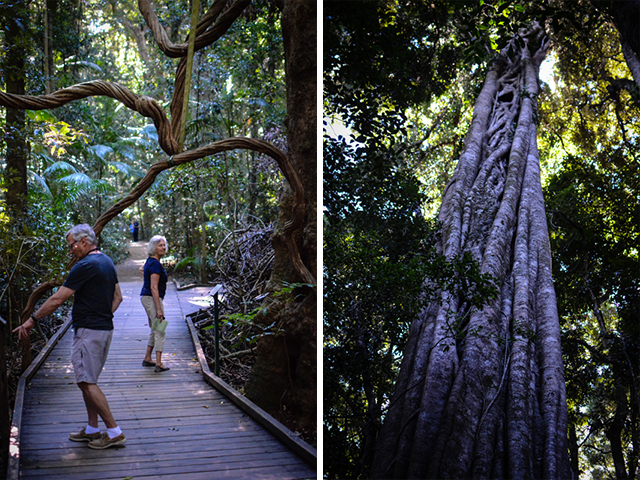

I shouldn’t speak for the group, but I got a good gravitational hiding the next day hiking Mount Ngungun. It’s one of the volcanic plugs popping out of the flatlands that makes up the Glasshouse Mountains. It’s a great trek to the top and a killer view of all the other mesa-like monoliths and the Tasman sea beyond.
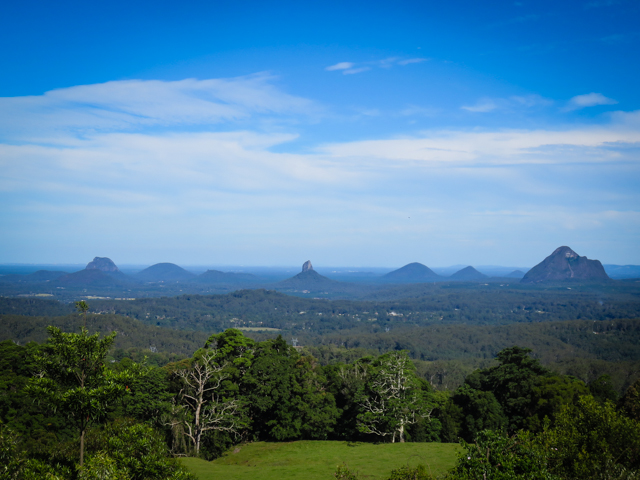

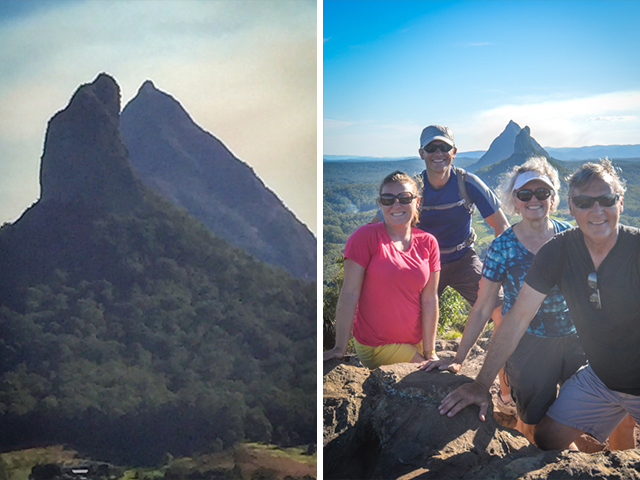
The eco-lodge we stayed in that night recycles rain water, grows its own fruit, and is accessed through fields of pineapples. We made sure to erase any benefits of our day’s physical exertion by playing cards, mowing pizza, and smoking Cuban cigars just for good measure.
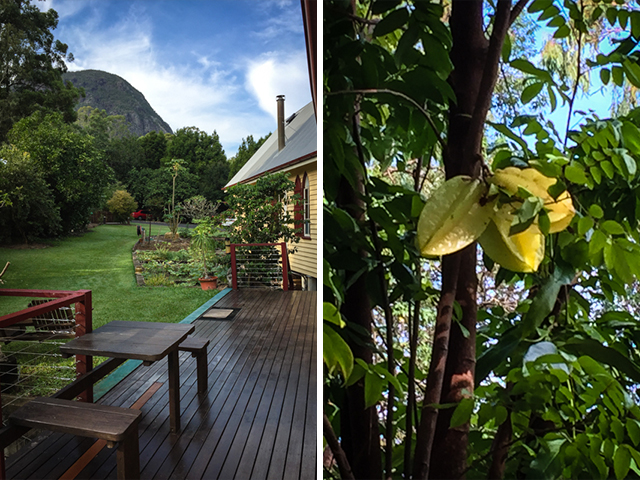
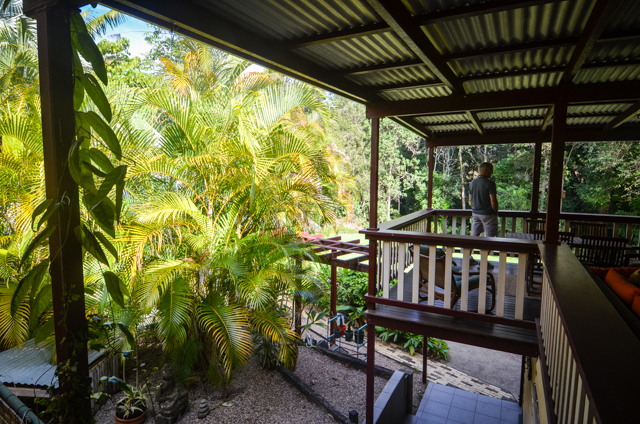
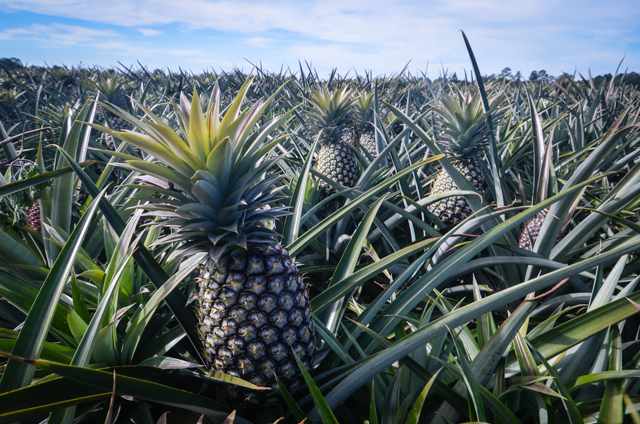
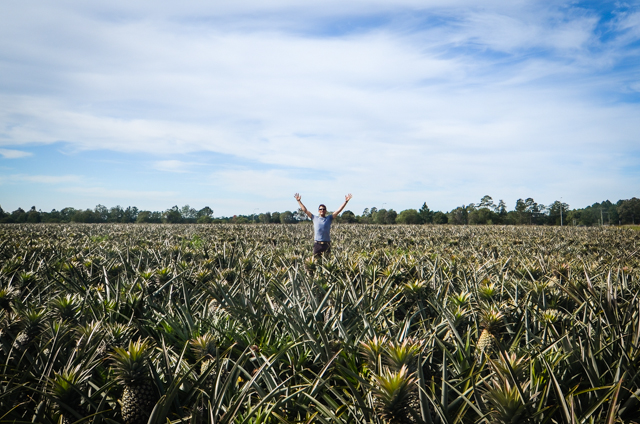
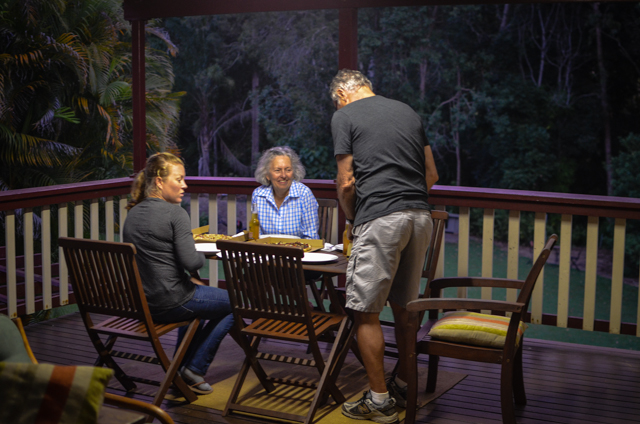
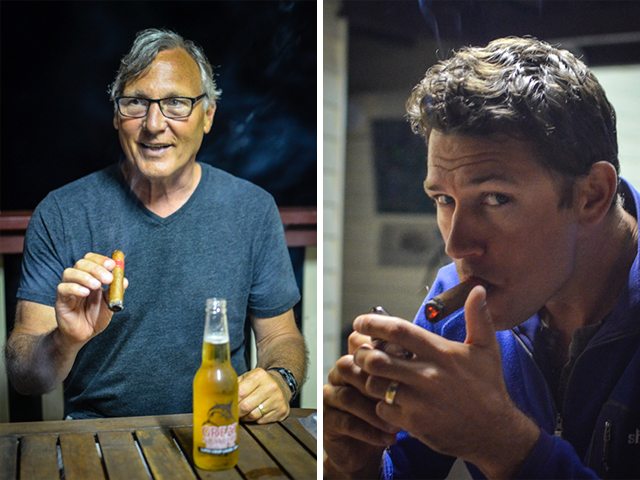
Also along the way south, Eumundi’s busy market was a hit, as well as Noosa Head’s riverside park in the evening as the bats streaked overhead. Eventually we made it back to Brisbane. Miranda and I shanghaied the car to check on Tayrona in Coomera before we headed to Sydney the following day.
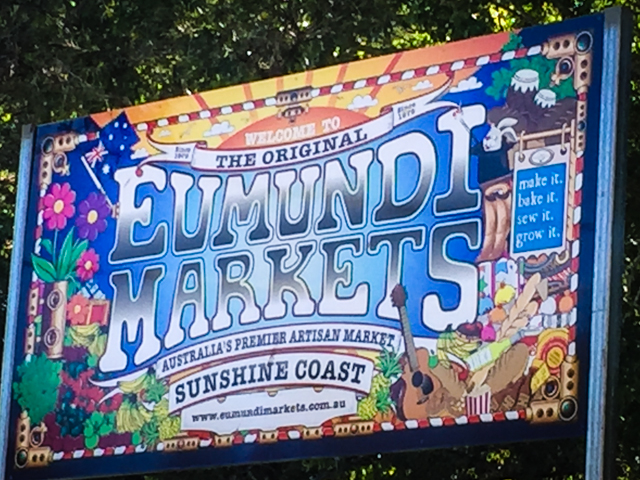
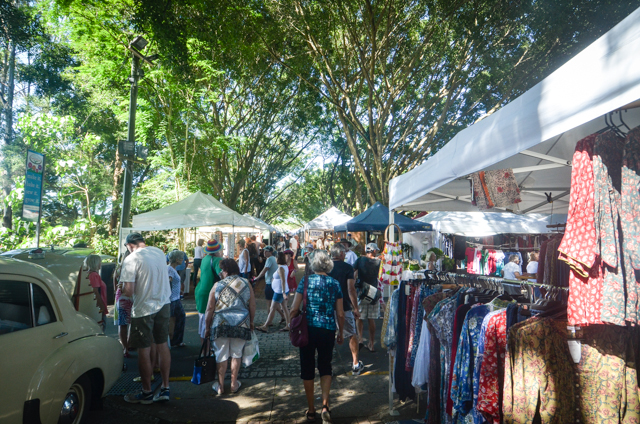
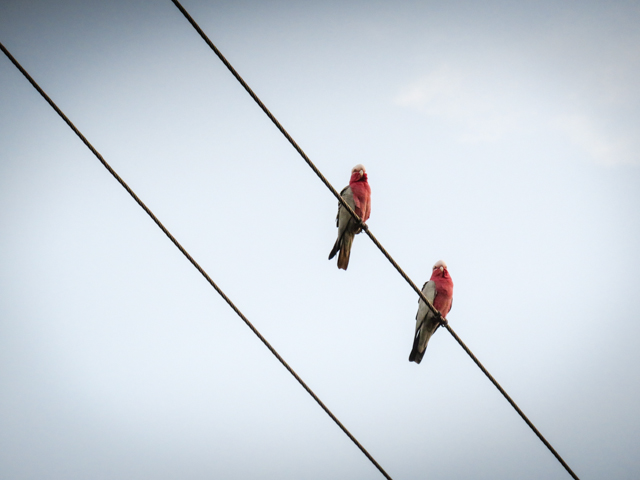
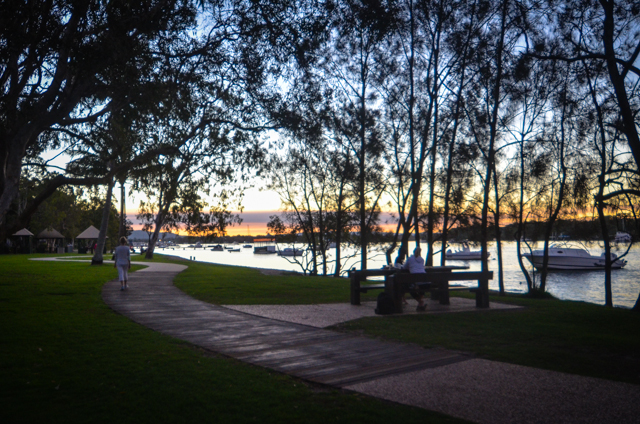
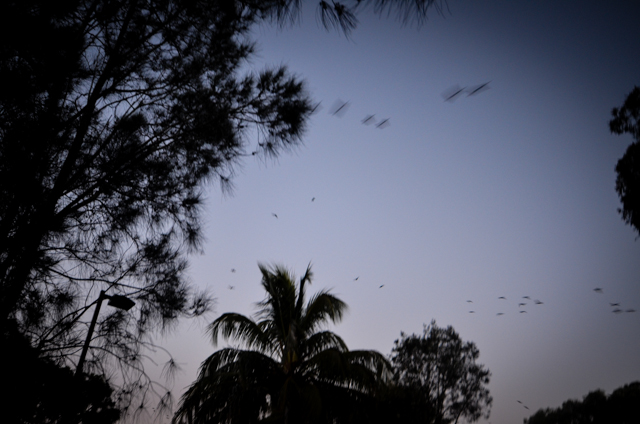
We found her with ‘flash’ new bottom paint and buffed out hull so shiny it reflected the jealously of the other boats in the yard. It’s odd to find your boat in a different spot from where you left it. After doing some work on Tay-Tay, The Boat Works guys had placed her in a prime location in the show yard, ready to be scooped up by a good sailor looking for a worthy vessel.
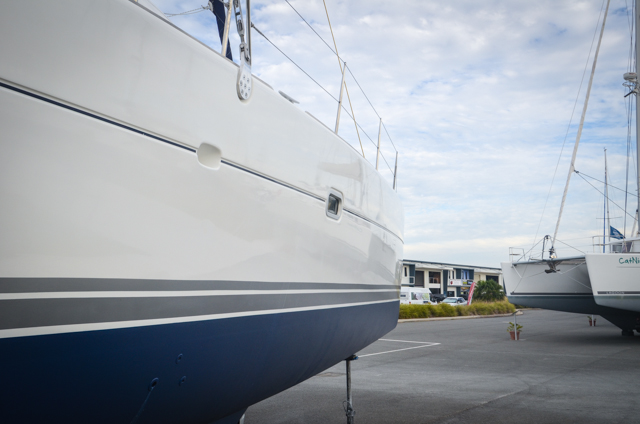
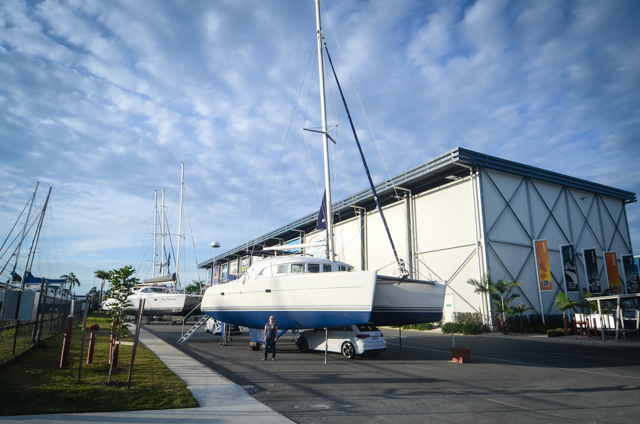
You’d think things would’ve quieted down after the rally when all the rowdy sailers dispersed, but Opua was just starting up. We got a few things done on the boat that needed work, hoisted our newly refurbished jib, and started planning our time in New Zealand. So many bays and islands in the Bay of Islands (imagine that!); it’s almost impossible to see everything without staying a season up here.
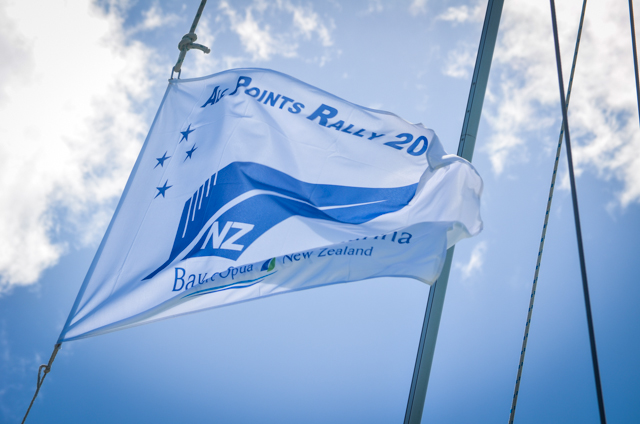
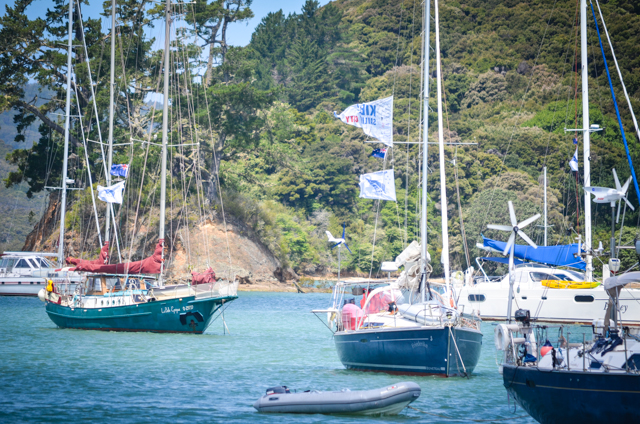
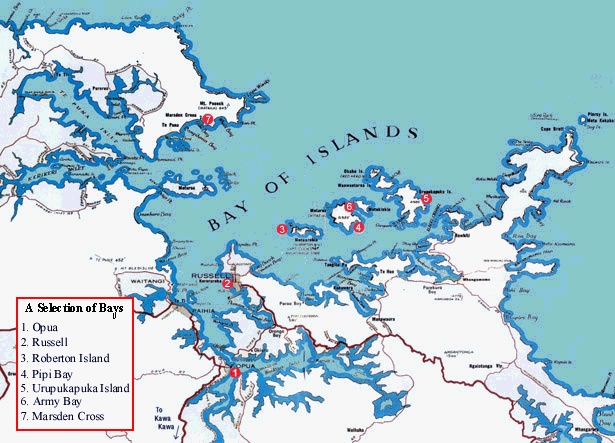
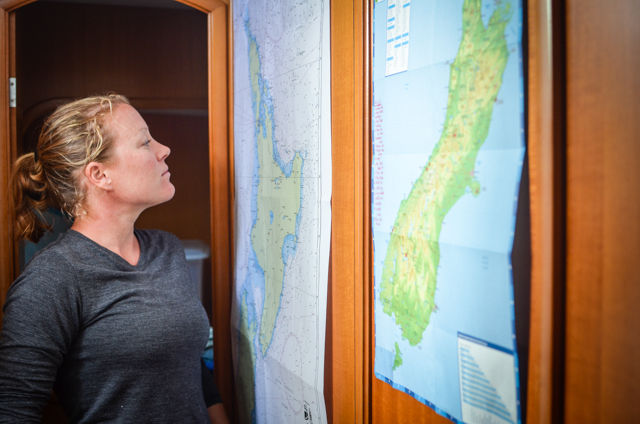
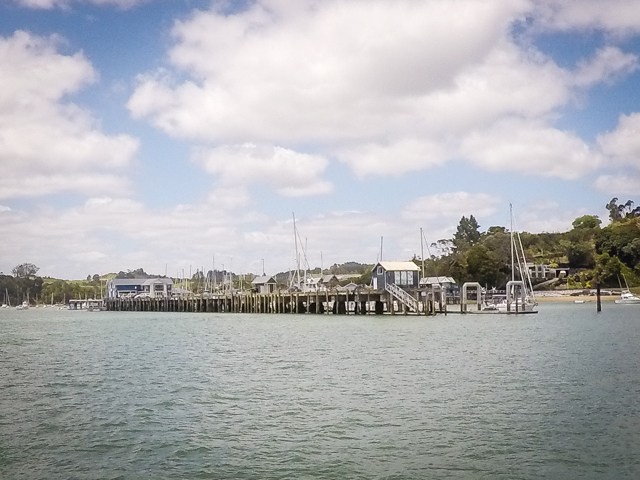
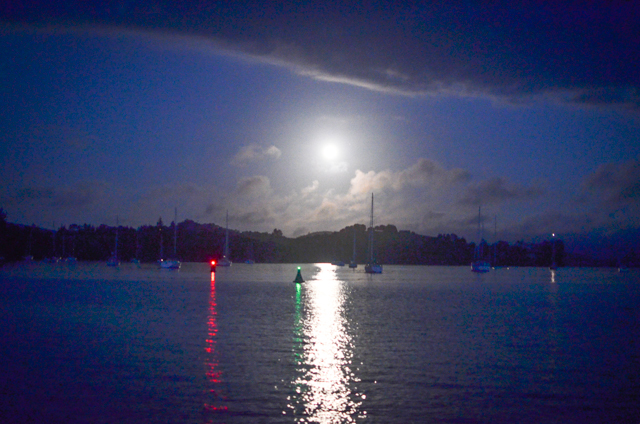
We hitched a ride to Kawakawa, a tiny town down the road from Opua. Apparently it was an old stomping ground of Austrian artist Friedensreich Hundertwasser, who lived in the tiny town for twenty-five years until his death in 2000. He must have had some bladder issues, as his lasting legacy to the community were some fabulous public toilets in his signature style. He even asked that the vegetation dug up for the construction be planted on the roof. Brilliantly eccentric mind indeed. After ‘visiting’ the landmark we nosed around Kawakawa and found almost nothing else there of interest. Makes me wonder what Hunderwasser saw in the village. Maybe just a blank canvas to work on. We were markedly less successful catching a ride back and ended up hot-footing the twelve kilometers back to Opua. It ended up being a lovely evening walk on a railroad grade turned bike path, which toddled over streams and through green pastured hills. Even made some friends with the locals.
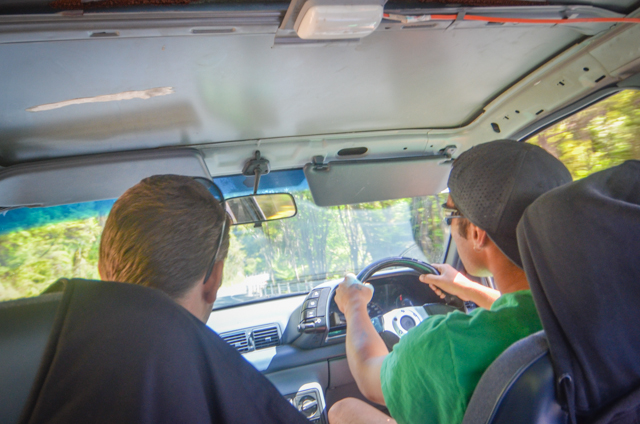
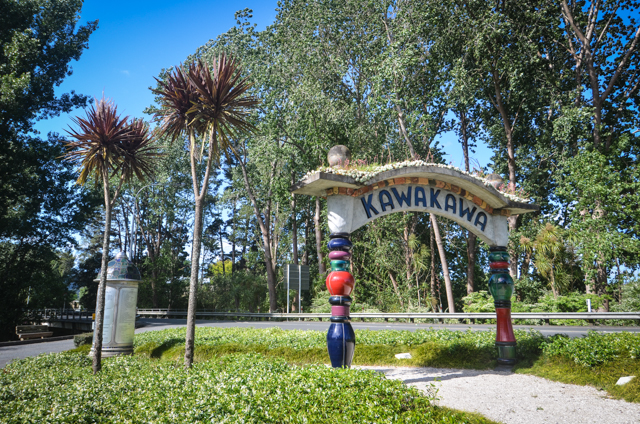
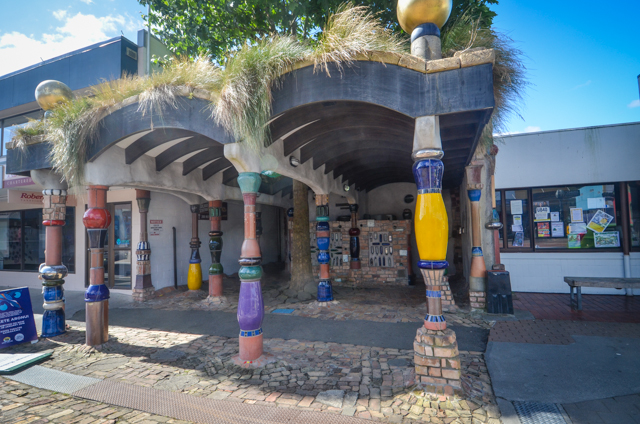
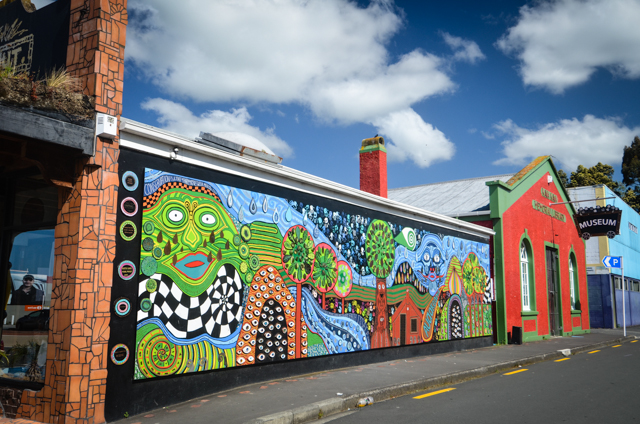
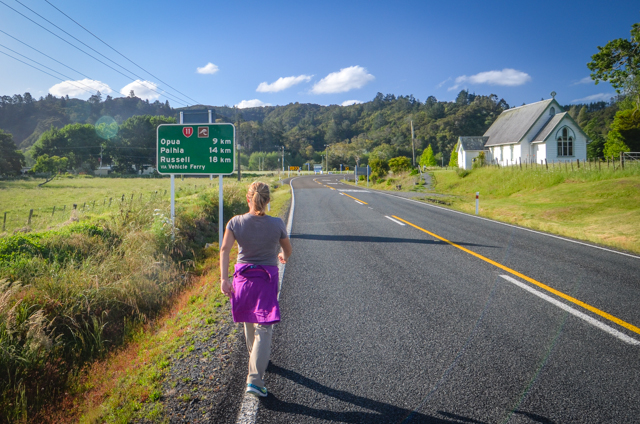
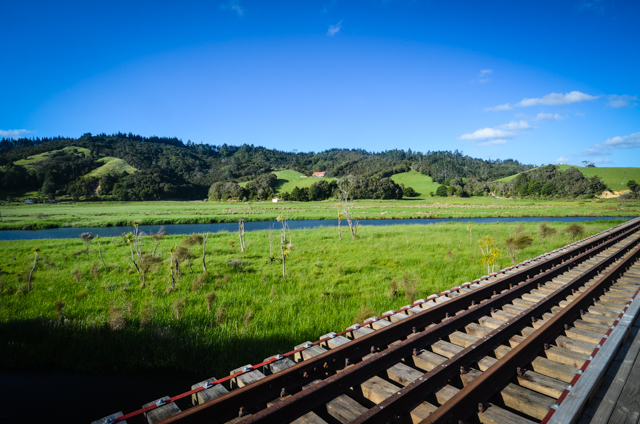
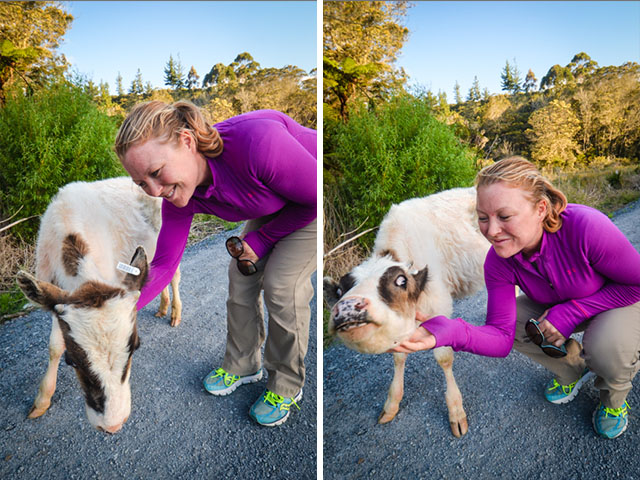
When all the necessary projects were done and we felt confident that neglecting the unnecessary ones wouldn’t endanger the boat, we pulled anchor and got out of dodge. Though we consulted weather predictions before we left, the three nautical-mile passage downriver to the next little town of Russel happily left little time to find ourselves besot by raging storms.
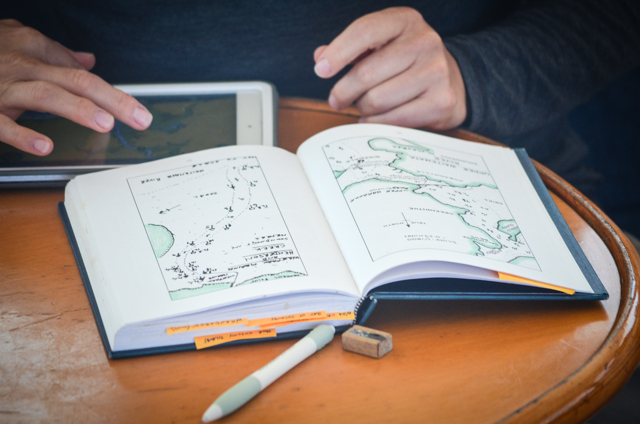
Russel, formerly Kororareka, has come full circle. The town’s original name in Maori means ‘Sweet Blue Penguin’, but received the handle “Hell Hole of the Pacific” in the 1800’s due to the debaucherous whalers who took leave and excessive liberties there while ashore. It’s ‘Russel’ now, and despite a touch of an identity crisis, it’s pretty much quaint and touristy, drawing crowds like zoo-going ice cream slurpers around the Sweet Blue Penguin exhibit. We even saw some penguins on the way which should’ve cued me in on the water temperature. But more about that later.
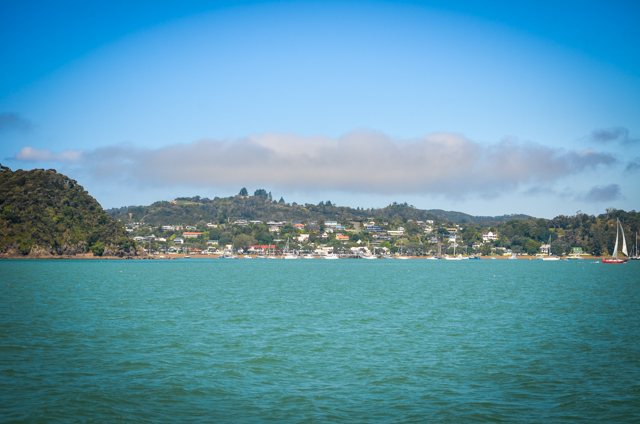
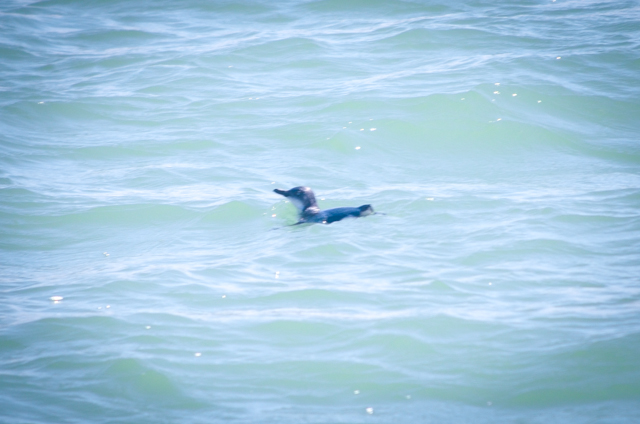
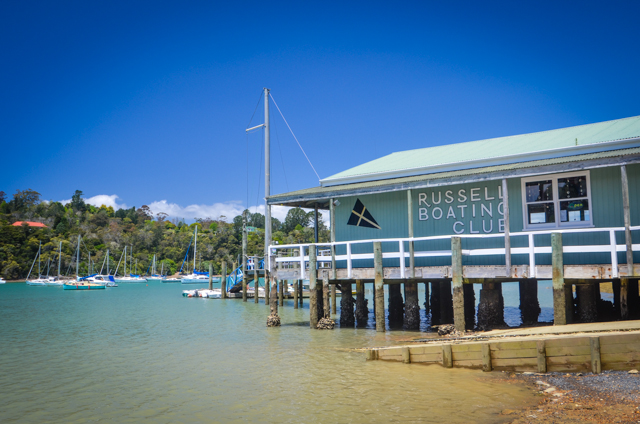
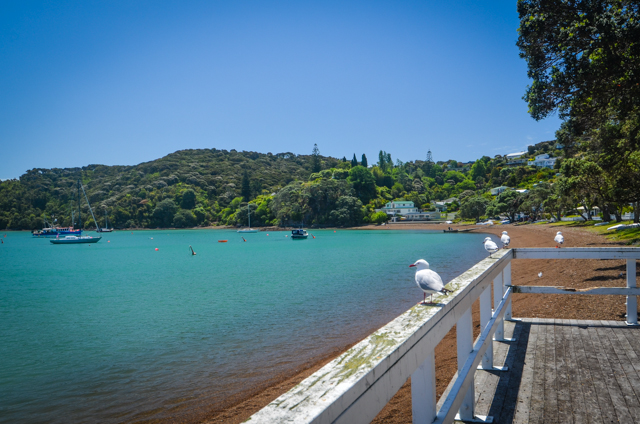
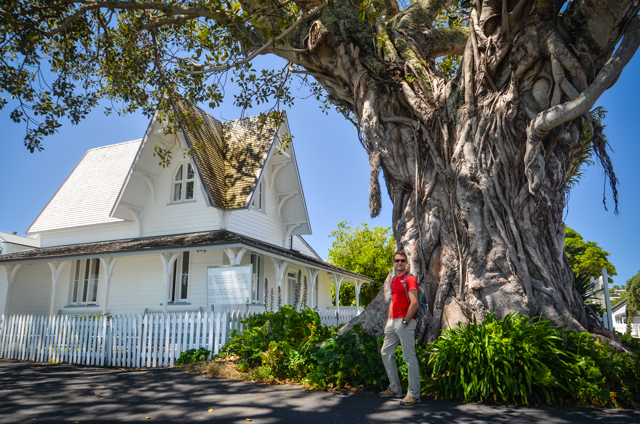
Thanksgiving stretched out for a few days like a fat and happy cat in front of a fire. Miranda and I made a small, pseudo-Thanksgiving dinner on Thursday and had a beautiful evening to ourselves on the boat watching the sunset. On Friday it was Thanksgiving back home, so we spend the day calling friends and family. Saturday we had plans with friends on a couple other boats to have a proper Thanksgiving dinner, so we descended with the crew from Georgia and Pau Hana on the unsuspecting Second Wind and feasted. Staggered around Russel for a scenic tour to walk off our distended bellies. Ended up laying in the grass.
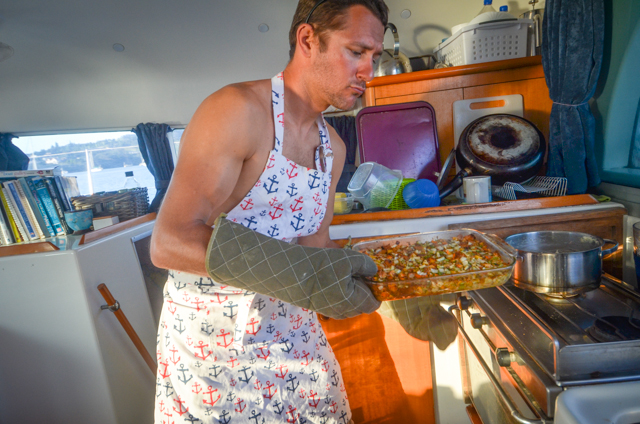
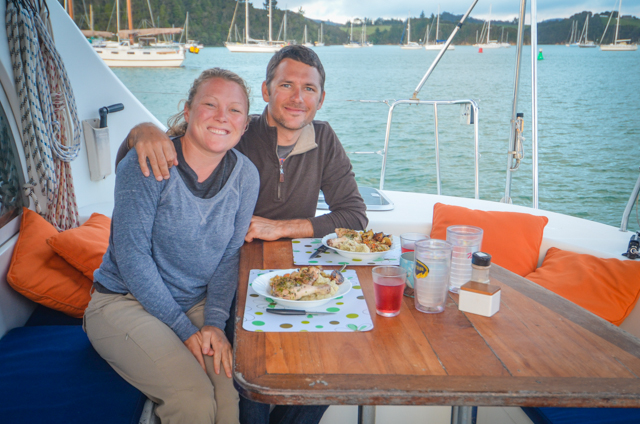
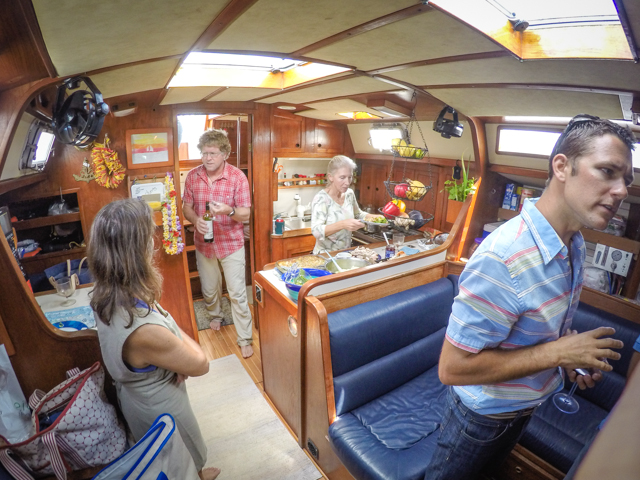
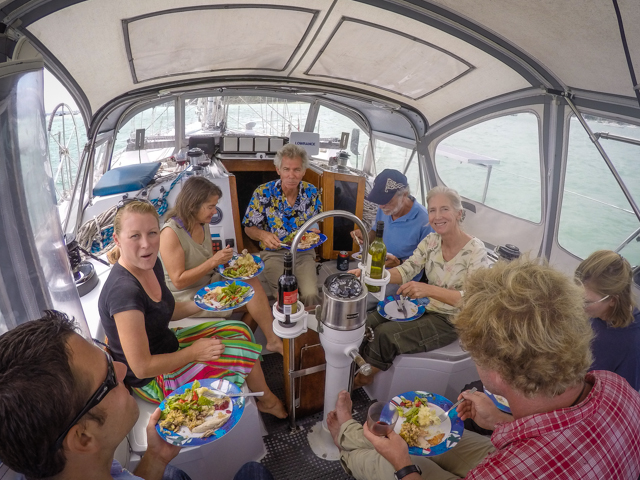
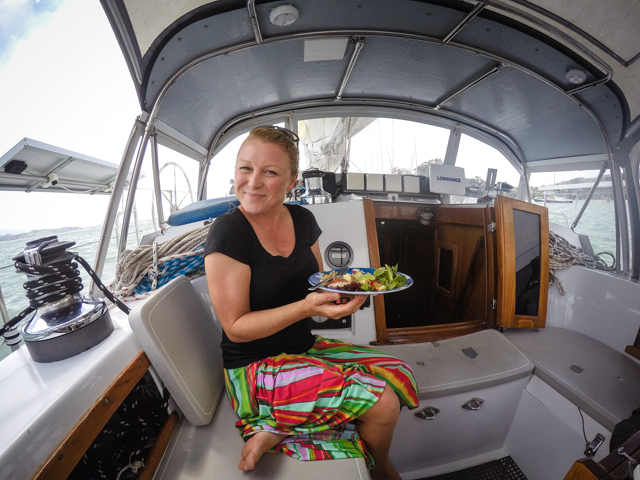
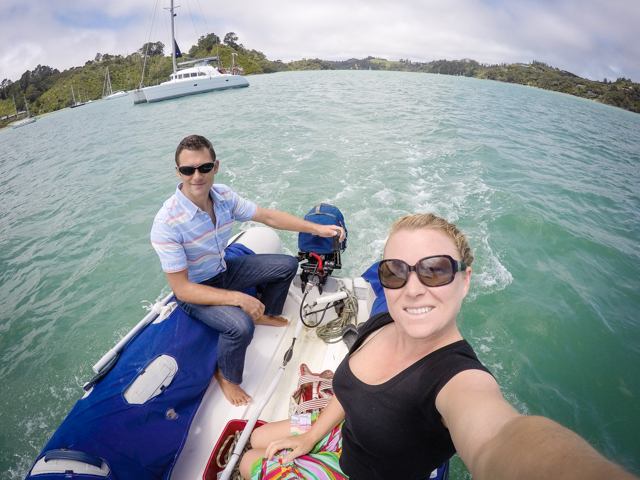
Motorsailed another three miles to Robertson Island, also called Motuarohia. I always wondered how anthropologists knew where and when early peoples moved around. Apparently New Zealand was populated not from Australia or even Fiji, but from Tahiti! The connection can be seen in the native languages which are pretty similar. The names of all the islands here start with ‘motu’, which means island in Maori and also in Tahitian! Same with va’a and waka which is canoe in Tahitian and Maori, respectively; the k and the glottal stop make the pronunciations very similar and both starting sound taking on more of an f-sound. Tracing these language similarities is one of the means for mapping the flow of human migration. Pretty neat. We hiked around Motuarohia, up to a pa site, a primitive fortification to ward of sieging neighbors. Not much was left of the site, but the view was excellent.
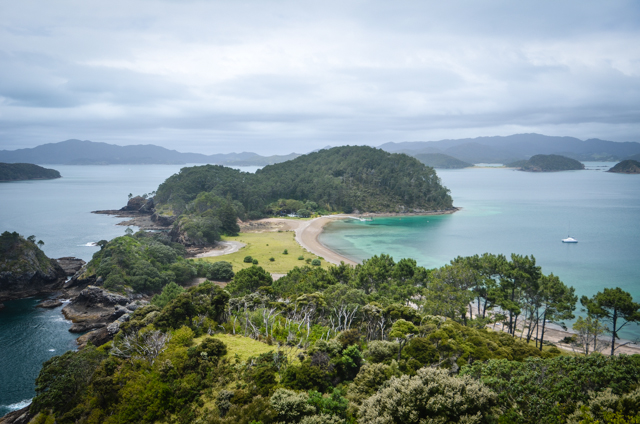
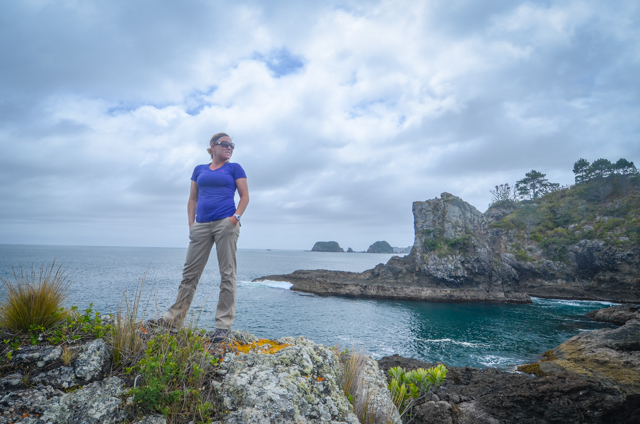
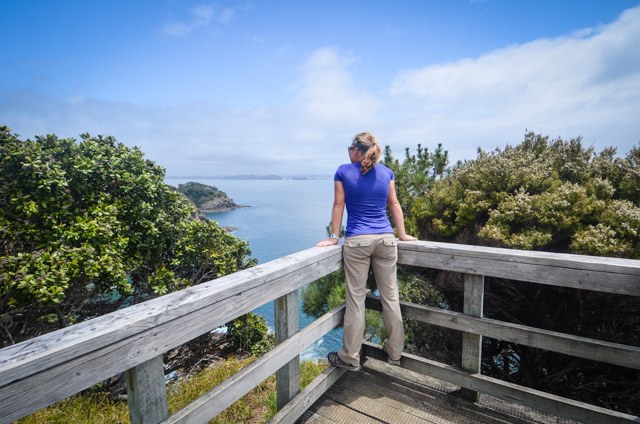
Red shows migration 30,000 years ago; green 3,000; maroon 2,000; and dark blue 1,000 years ago.
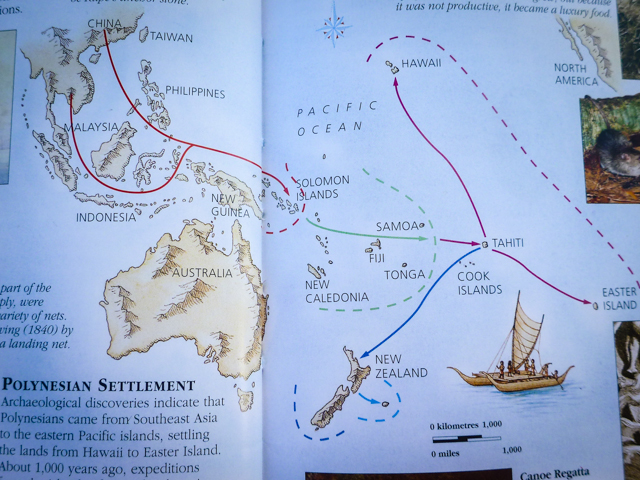
Speaking of primitive, rock oysters are everywhere down here. They cling to almost all rocky seashore you’ll find. Following as the locals do, we pried a few off and brought them home for dinner! I was just hamming it up with the faces; they were slurp-risingly good! Enough butter, lemon, and parmesan make even the most repugnant bivalve delectable!
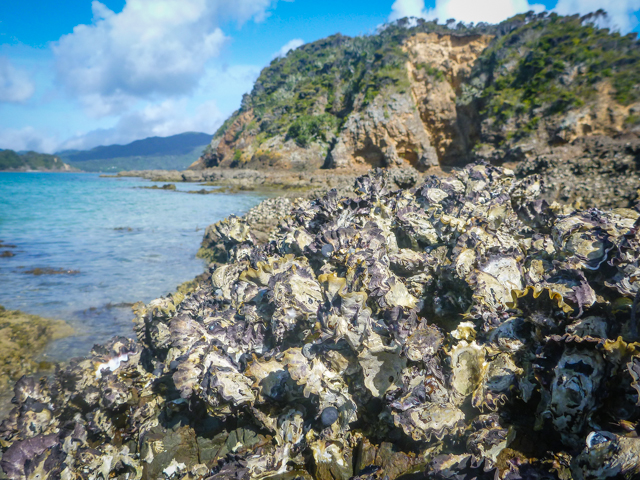
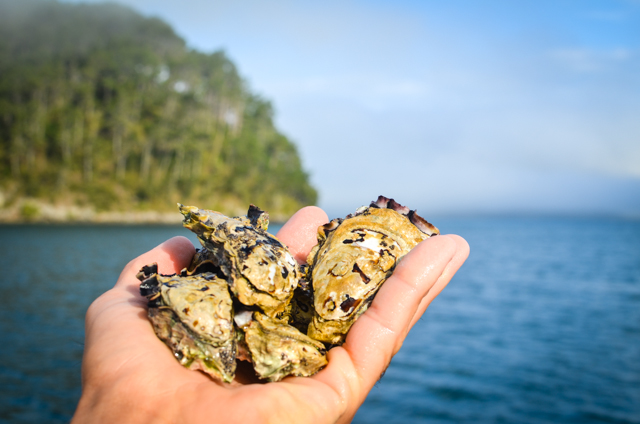
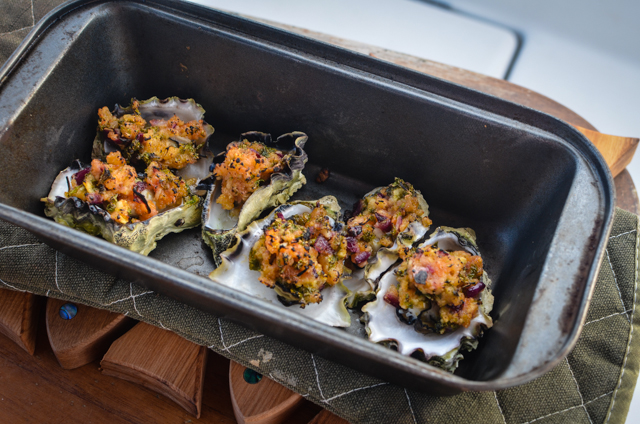
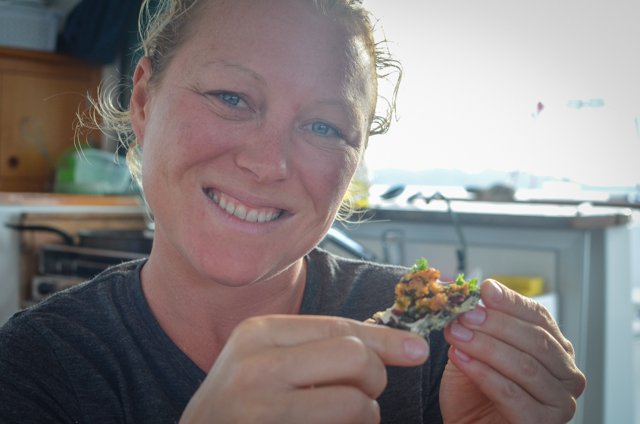
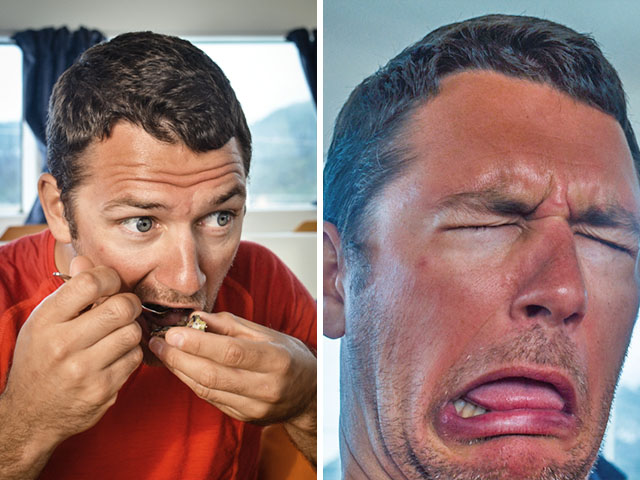
I broke out the heavy suits, hoods, gloves and went to check out the underwater flora and fauna. Lots of kelp, shellfish, and rocks. Reaching down to pick up a cockle shell out of pile, I was startled to see a large monochromatic iris dilate to look at me. The octopus poofed out his skin to make it look spiky and changed from brown to orange. It did the job, and I backed off. In an hour of snorkeling I had seen five of them. I love calamari and liked octopus when I’ve had it before, but I can’t bring myself to catch (read: impale on a harpoon) any of them. I’ve read accounts of them sneaking out of their tanks in captivity to eat fish in other tanks at night, then pop back into their tank and look innocently out in the morning. There’s also account of them ripping the stinging tentacles off jellyfish and using them to hunt their own prey. Don’t just take my word for it, check out Inky’s story. That kind of smarts deserves a pass. Plus they’re scary looking.
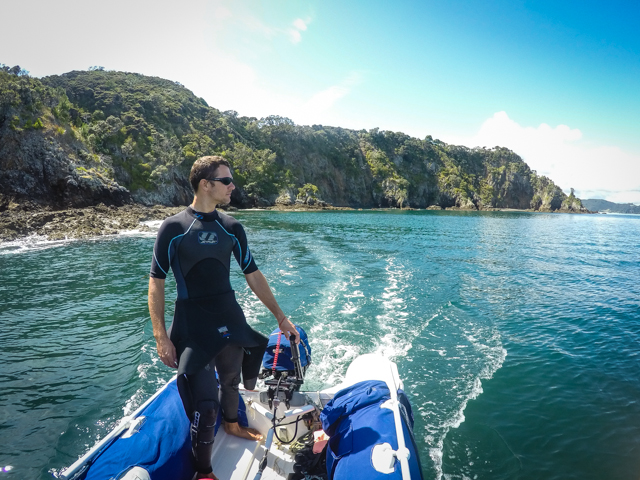
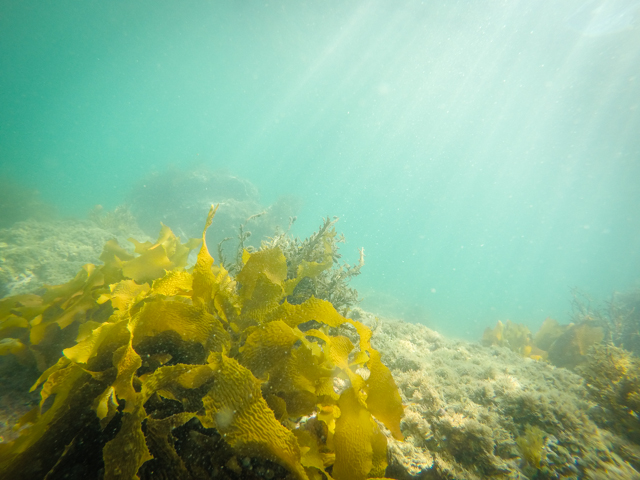
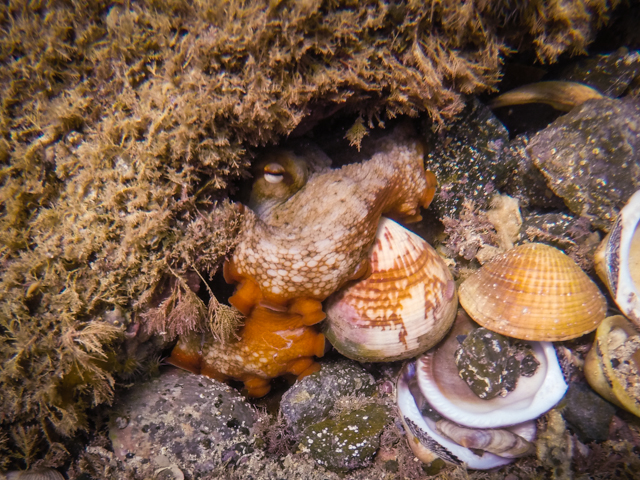
The cold water and warming summer air make for some great fog banks in the mornings. As we sailed three more miles over to Urupukapuka we ran the radar looking for other boats in the mist. Fabulous hiking and a great name? What’s not to like about Urupukapuka?
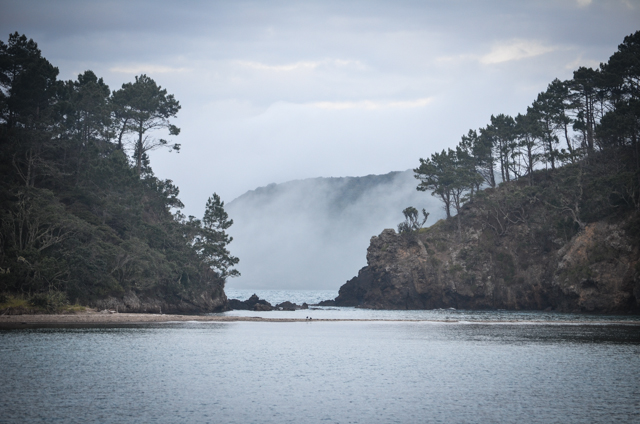
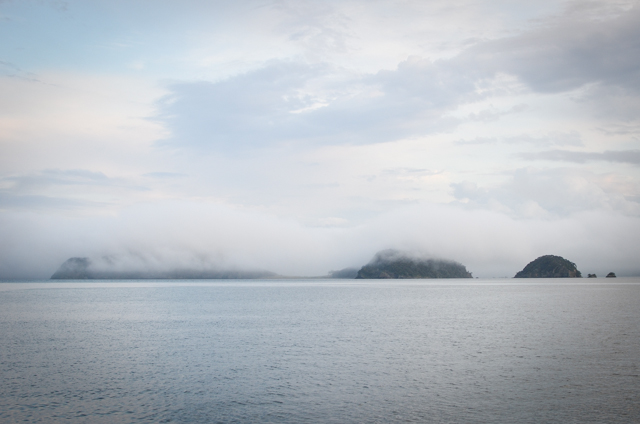
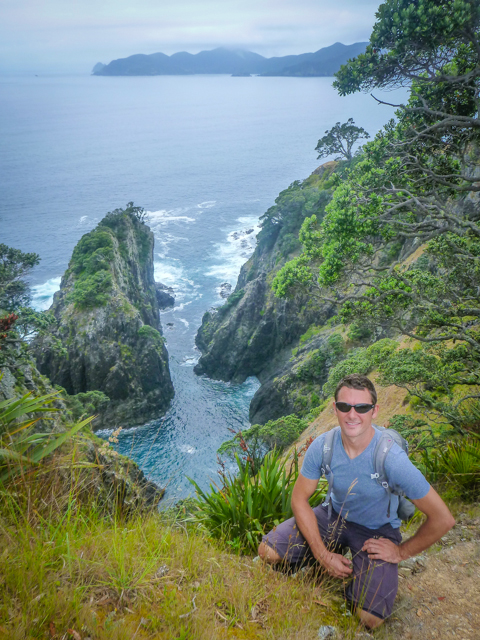
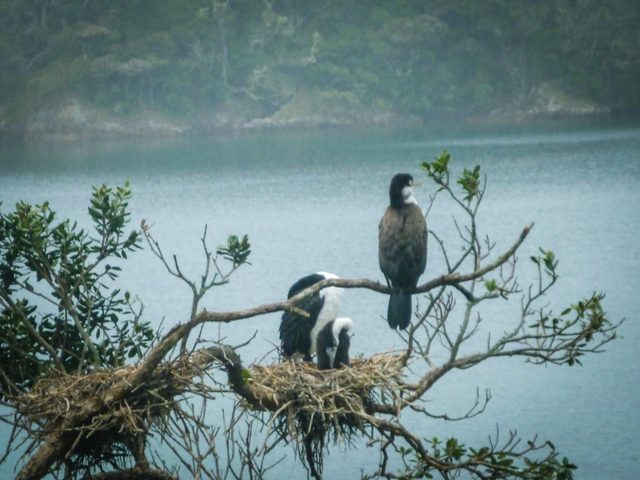
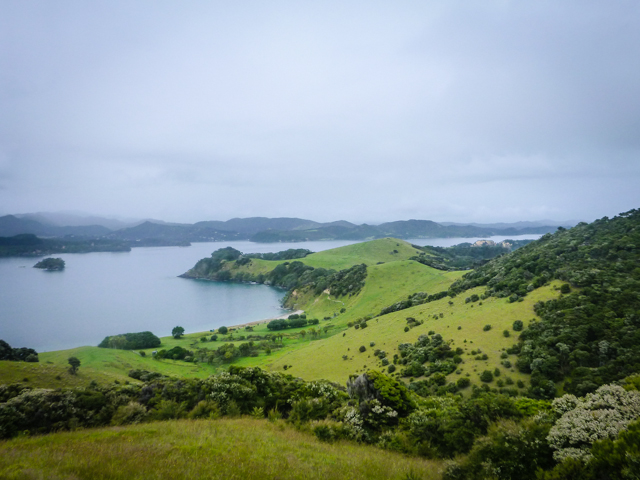
Another thing to love is the scallop beds! In an hour of free diving I gathered a dozen scallops and five green-lipped mussels. They lie in shallow depressions on the bottom with a light covering of silt for camouflage. It’s not too hard to see and pick them up, but they are wilily and open and close rapidly to jump out of your hand and then can actually swim away from you with jets of water! Cleaning them isn’t difficult, though it’s off-putting to have the ones awaiting shucking start clapping and spitting water out of the bucket. “Let me out!” Alas, ’twas not to be. There was ‘streaky bacon’ in the fridge, waiting to be wrapped around the scallops like an octopus tentacle around an unsuspecting wader’s ankle. Into the oven with ye!
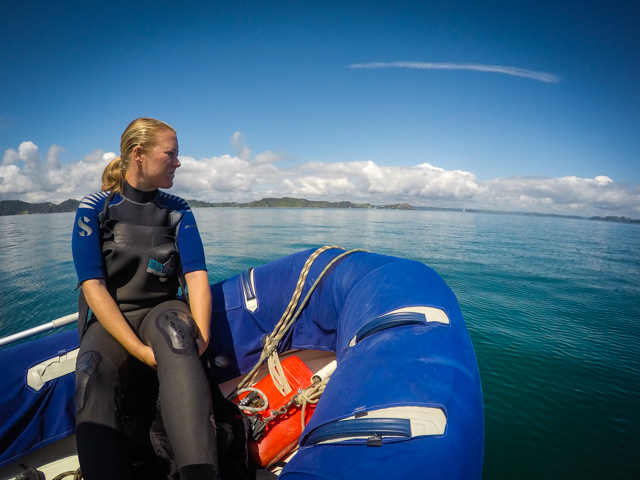
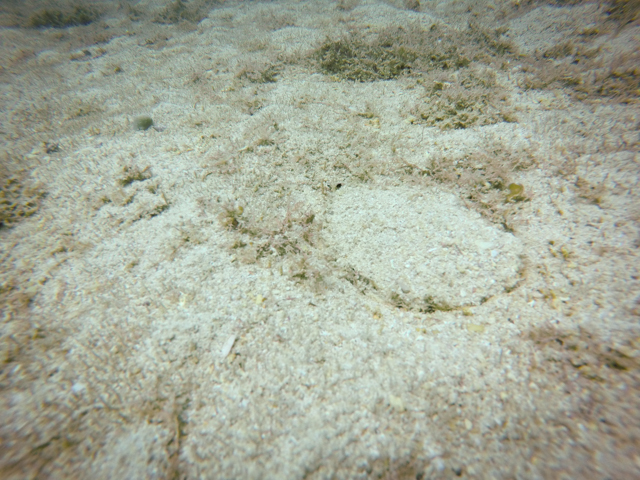
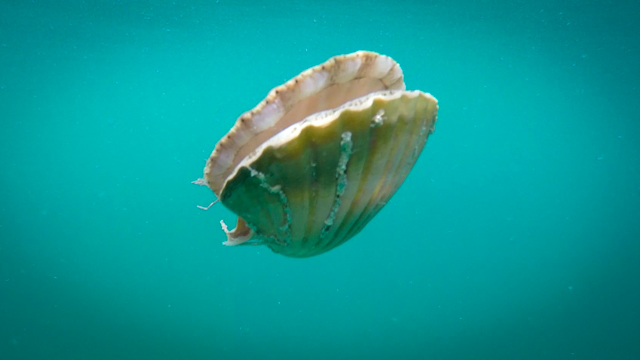
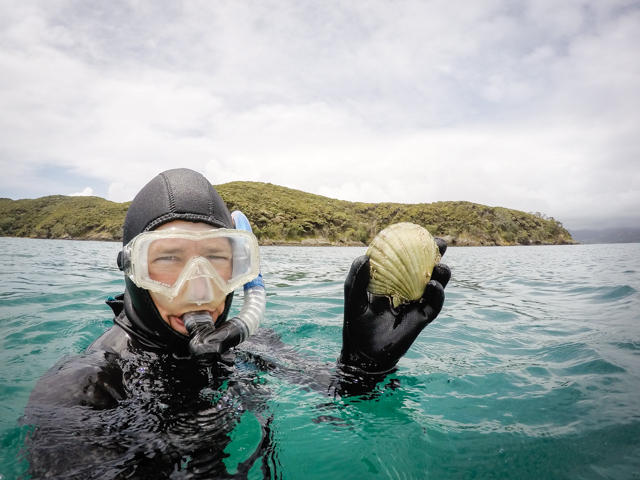
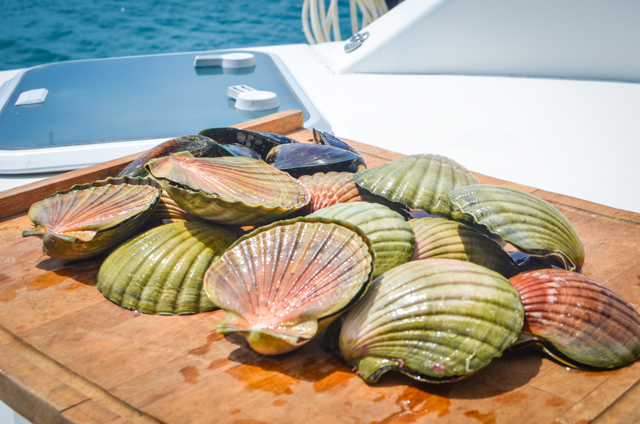
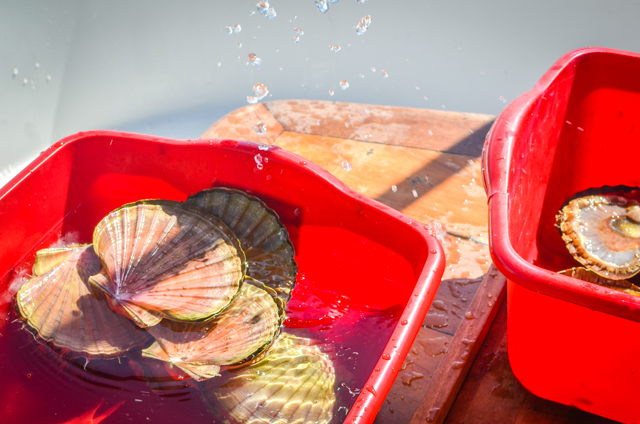
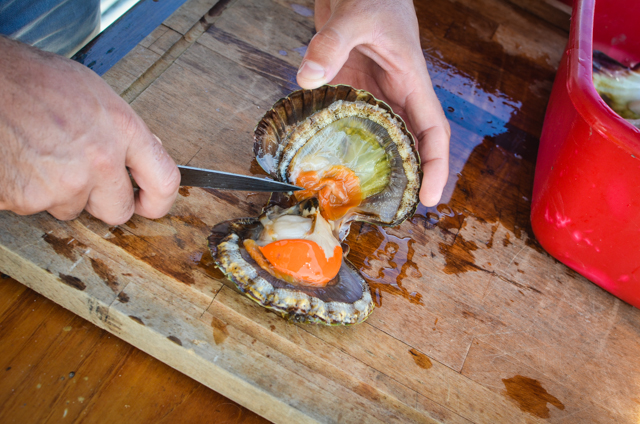
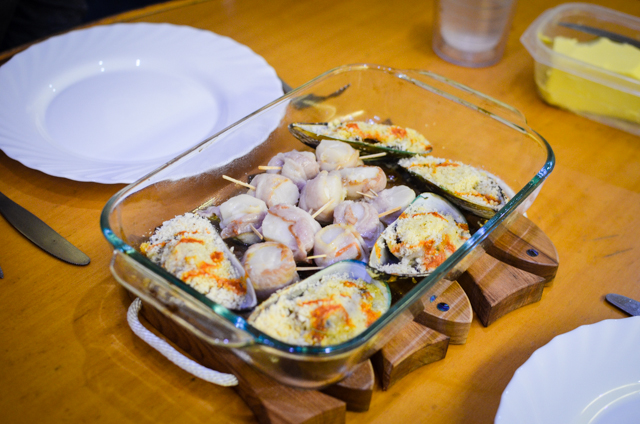
We’re out of the Bay of Islands to run down the coast towards Whangarei as soon as we stop feeling like beached whales and can stand again!
